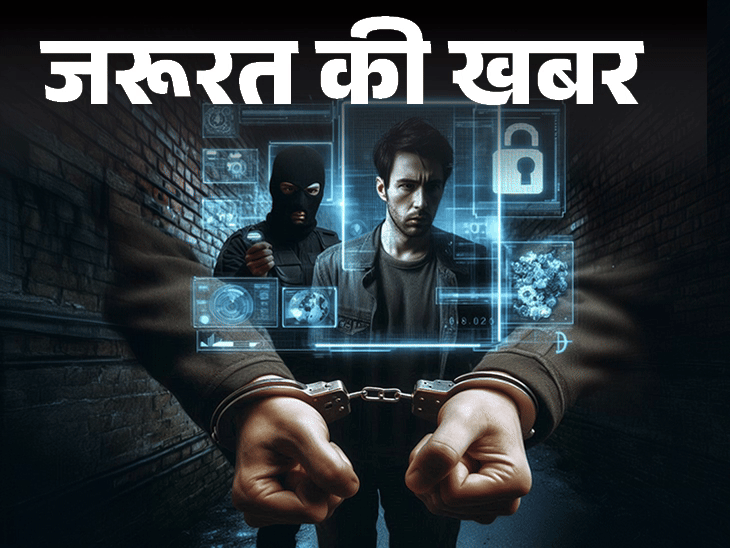7 days agoAuthor: Sandeep Singh
- copy link

A female doctor in Noida, Uttar Pradesh became a victim of cyber fraudsters. Cyber fraudsters kept the female doctor under digital house arrest for two days and then swindled Rs 60 lakh from her. According to the police, the cyber fraudsters threatened to issue a fake arrest warrant by claiming to be an officer of the Telecom Regulatory Authority of India (TRAI). After this, the female doctor was forced to transfer money.
A similar case came to light a few days ago from Gomtinagar, Lucknow, where famous Hindi poet and litterateur Naresh Saxena was put under digital house arrest by cyber fraudsters posing as fake CBI officers.
Cyber criminals kept Naresh Saxena locked in a room for 6 hours. During this time they also obtained important documents and bank account information from him. However, family members reached on time and saved him from being cheated.
According to the Reserve Bank report, fraud worth more than Rs 30 thousand crores took place in the country in the year 2023. 65,017 cases of fraud have been reported by Indian banks in the last decade, due to which a total loss of Rs 4.69 lakh crore has occurred.
Under House Arrest, the work of setting up fake police stations, fake government offices and wearing fake uniforms is being done to carry out the fraud.
so today news of need I will talk about what is digital house arrest? Also, we will know how to avoid it?
Expert: Rahul Mishra, Cyber Advisor (Uttar Pradesh Police)
Question- What is digital house arrest?
answer- In this new method of scam, cyber criminals trap people through audio or video calls, AI generated voice or video calls and claim themselves to be police officers, Narcotics Control Bureau (NCB), Central Bureau of Investigation (CBI) officers or customs officers.
Cyber expert Rahul Mishra says that cyber criminals use many tricks to trap people in their net. For example, cyber criminals tell the victim that he has seen child porn or that his Aadhaar card number or PAN number has been used in some drug booking case.
After this, people are asked to talk on video call for interrogation in the name of digital arrest. In most of the cases, cyber thugs create a police station like setup and sit wearing police uniform, which makes people think everything is real.
Cyber criminals threaten people that if they tell their family or friends about it during the entire investigation, they will have to face serious consequences. In this way, cyber criminals keep people detained for hours in the digital space.

Question – How can one avoid digital house arrest?
answer- To avoid any kind of scam, the most important thing is to be alert and vigilant.
Recently, Noida Police had issued an advisory to protect citizens from ‘digital house arrest’. In which they had told that whenever you receive such calls or messages, immediately inform the concerned authorities. The government has launched Chakshu portal in the Sanchar Sathi website to prevent cyber and online fraud. Victims can also complain about such incidents to the nearest police station or cyber police station.
Understand how to avoid digital house arrest from the graphic given below.

Let us understand these points given in the graphic in detail.
Stay updated on new methods of cyber crime
Cyber criminals are inventing new ways of cheating every day. According to the Indian Cyber Crime Coordination Center (I4C), more than 7.40 lakh complaints of cyber fraud have been registered till April this year.
In these first four months, cyber criminals have committed fraud of more than Rs 1750 crore. This includes investment scams, trading scams, digital fraud scams and other methods of online fraud. Therefore, be alert and cautious to avoid such methods of fraud. Stay updated about new methods of cyber fraud. Identify such threats on time.
Please verify the call
If someone calls from an unknown number claiming to be from the police, CBI, NCB or any other government agency, be cautious. Contact your nearest police station to confirm the call. Do not share any information without confirmation.
Do not transfer money to unknown numbers
Always keep in mind that no government agency calls and pressures you to make online payments. If someone pressures you to transfer money immediately, be careful. Most of such calls are frauds. Do not make any payment without verification.
Question: What steps have been taken by the Government of India to stop such scams?
answer- Recently, the Home Ministry has blocked more than 1000 ‘Skype IDs’ involved in cyber crime and blackmailing. The ministry said that all the government agencies, RBI and other organizations are working together to stop cyber fraud. The police of states and union territories are also helping in this.
The Indian government had issued a directive to all telecom companies to block 28,200 mobile phones. Along with this, several lakh SIM cards linked to these phones were asked to be re-verified. Last year too, telecom companies had blocked more than 2 lakh SIM cards linked to cyber crime.
I4C also shares information about this on its social media platforms Cyberdost, Twitter, Facebook, Instagram to make people aware. The government has advised people to be cautious about such crimes and also warn others about cyber crime.
Question- Where to complain in case of cyber crime?
answer- If you receive any such call or message in which money is demanded by threatening, then definitely complain about it to the nearest police station or cyber crime helpline number 1930. The government has launched ‘Chakshu Portal’ on the Sanchar Sathi website to prevent cyber and online fraud. Apart from this, you can also register a complaint online at http://www.cybercrime.gov.in.



